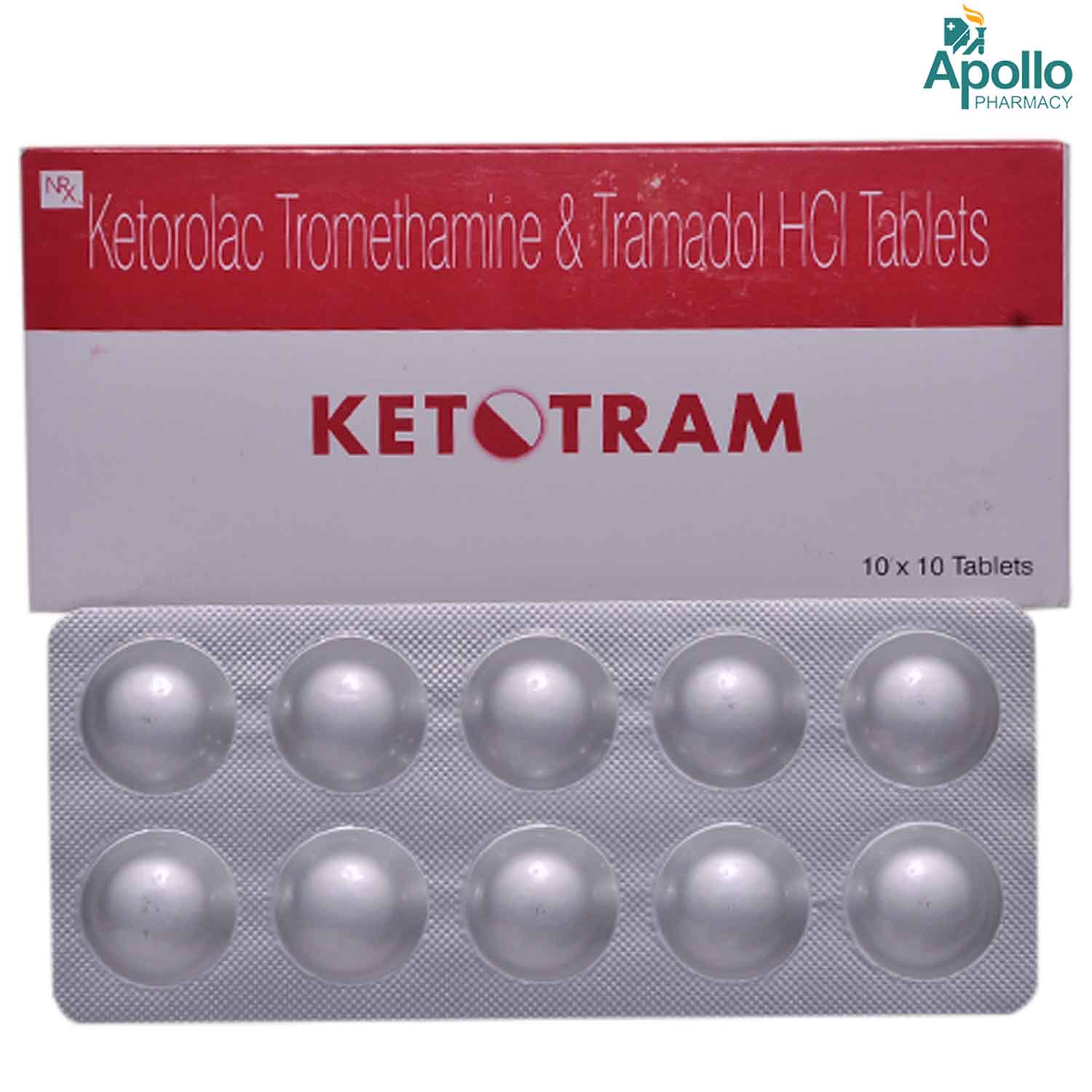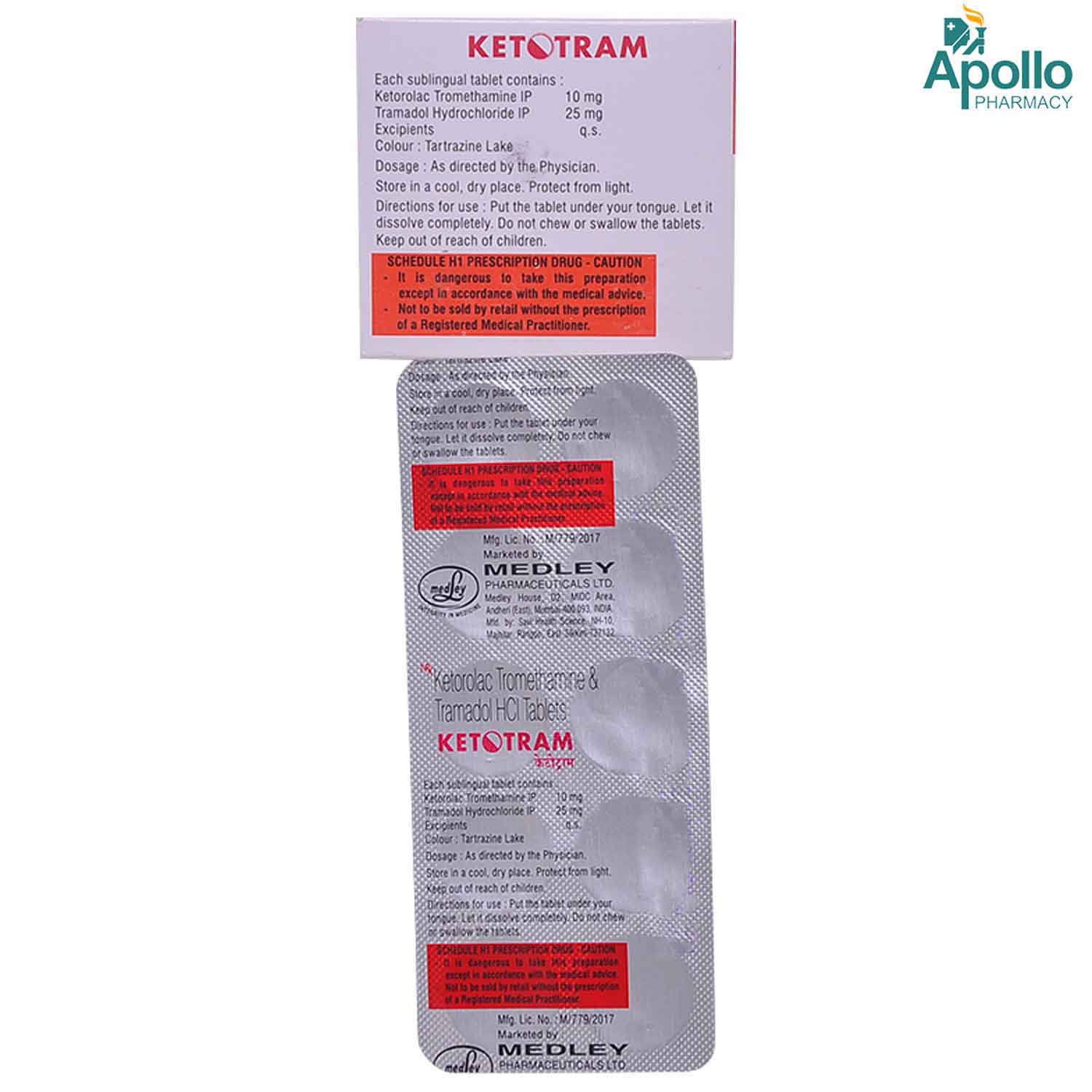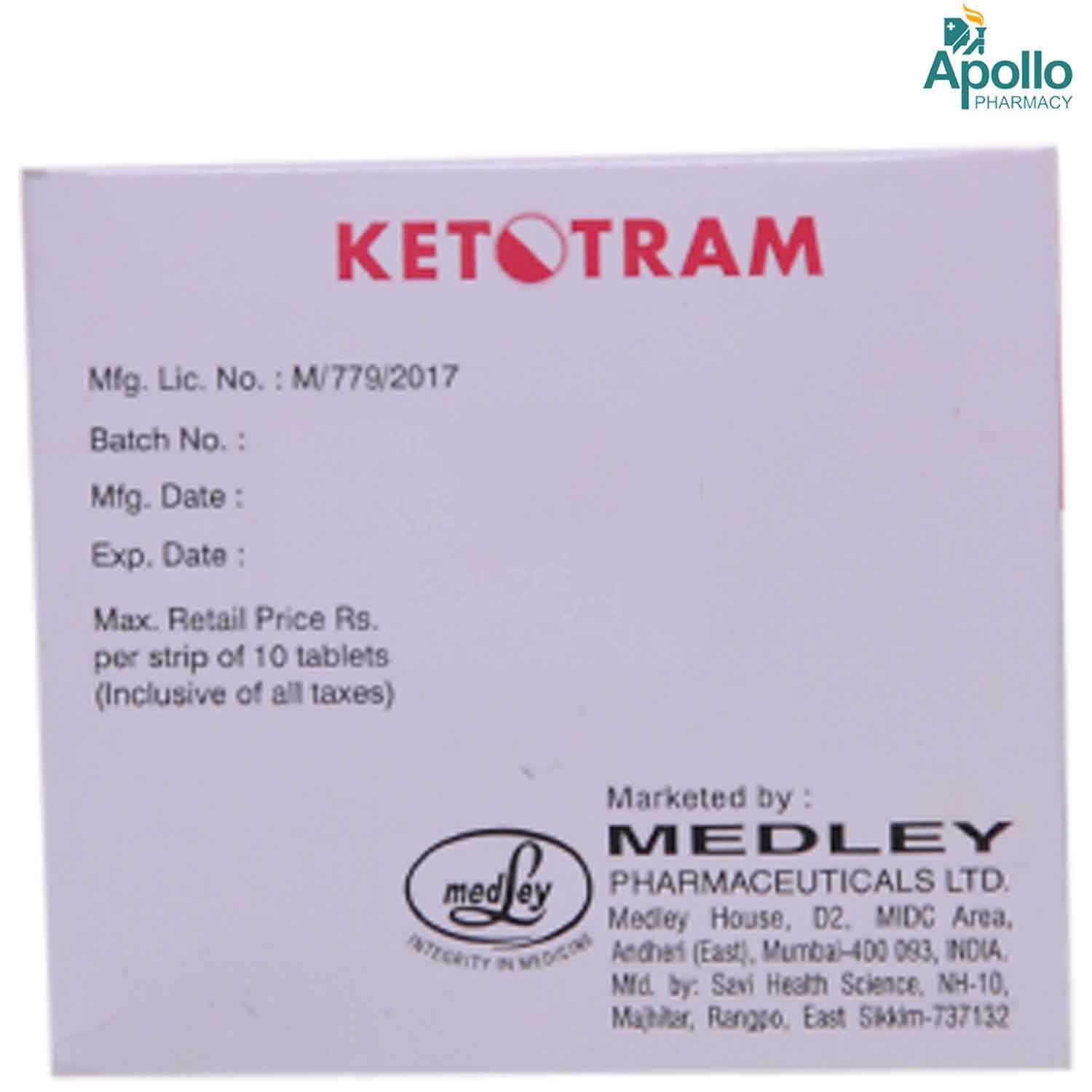Ketotram Tablet 10's
MRP ₹115
(Inclusive of all Taxes)
₹17.3 Cashback (15%)
Provide Delivery Location
Online payment accepted
 Prescription drug
Prescription drugWhats That
Composition :
Manufacturer/Marketer :
Consume Type :
Expires on or after :
Return Policy :
About Ketotram Tablet
Ketotram Tablet belongs to the group of painkillers and analgesics used short-term to relieve moderate to severe pain. Pain is a sensation that occurs in response to external injury, stress, infection and travels as an impulse through body cells, producing an unpleasant feeling and alerting the body to act.
Ketotram Tablet contains Ketorolac and Tramadol. Ketotram Tablet works by reducing the production of inflammatory substances (prostaglandins) and thus, relieves the body of swelling and subsequent pain. Ketotram Tablet also blocks pain-producing nerve transmitters, thereby providing pain relief.
Take Ketotram Tablet as prescribed. Ketotram Tablet may cause certain common side effects such as stomach ache, nausea, vomiting, gas, and dizziness. Most of these side effects do not require medical attention and will resolve gradually over time. However, you are advised to talk to your doctor if these side effects persist.
It is advisable to inform the doctor if you are allergic to any of the components of Ketotram Tablet . Consult your doctor if you are pregnant, planning to get pregnant, or breastfeeding. Ketotram Tablet may cause dizziness, so drive only if you are alert. Avoid taking alcohol with Ketotram Tablet as it might lead to increased dizziness.
Uses of Ketotram Tablet
Directions for Use
Key Benefits
Ketotram Tablet is an analgesic that is used as a painkiller for short-term management of moderate to severe pain. Ketotram Tablet contains Ketorolac and Tramadol. Ketorolac is a non-steroidal anti-inflammatory drug (NSAID) that works by reducing the levels of inflammatory substances called prostaglandins. Prostaglandins are produced at the site of injury and cause inflammation and pain. Tramadol blocks the cellular reuptake of neurotransmitters (sensation-producing substances travelling through nerves) serotonin and noradrenaline, omitting pain impulses at the spinal level. Thus, Ketotram Tablet helps relieve pain.
Storage
- Drink water or other clear fluids.
- To prevent worsening of pain, limit intake of tea, coffee, or alcohol.
- Include bland foods like rice, toast, crackers, and rice in your diet.
- Avoid lying down immediately after eating as it may cause indigestion or heartburn.
- Avoid acidic and spicy food as it may cause indigestion.
- Drink ample water throughout the day to thin mucus and keep nasal passages moist.
- Utilize a humidifier, especially during dry seasons, to add moisture to the air.
- Limit exposure to cigarette smoke, dust, strong odours, and other environmental pollutants.
- Regularly use saline nasal spray to cleanse and moisturize nasal passages.
- Practice good hand hygiene to prevent spreading germs and avoid touching your nose unnecessarily.
- Elevate your head while sleeping to promote drainage from the sinuses.
- Identify and avoid known allergens through allergy testing and implement measures to reduce exposure like air purifiers.
- Inhale steam from a hot shower or bowl of water can help loosen mucus.
- Practice relaxation techniques like yoga or meditation to manage stress which can exacerbate nasal discomfort.
- Maintain a balanced diet rich in fruits and vegetables to support immune function.
- Hydrate your body: Drink enough water to prevent dehydration and headaches.
- Calm Your Mind: Deep breathing and meditation can help you relax and relieve stress.
- Rest and Recharge: Sleep for 7-8 hours to reduce headache triggers.
- Take rest: lie down in a quiet, dark environment.
- Cold or warm compresses can help reduce tension.
- Stay Upright: Maintain good posture to keep symptoms from getting worse.
- To treat headaches naturally, try acupuncture or massage therapy.
- Over-the-counter pain relievers include acetaminophen and ibuprofen.
- Prescription Assistance: Speak with your doctor about more substantial drug alternatives.
- Severe Headaches: Seek emergency medical assistance for sudden, severe headaches.
- Frequent Headaches: If you get reoccurring headaches, consult your doctor.
- Headaches with Symptoms: Seek medical attention if your headaches include fever, disorientation, or weakness.
- Take medications with food (if recommended): It can help prevent stomach distress and indigestion.
- Eat smaller, more frequent meals: Divide daily food intake into smaller, more frequent meals to ease digestion.
- Avoid trigger foods: Identify and avoid foods that trigger indigestion, such as spicy, fatty, or acidic foods.
- Stay upright after eating: Sit or stand upright for at least 1-2 hours after eating to prevent stomach acid from flowing into the oesophagus.
- Avoid carbonated drinks: Avoid drinking carbonated beverages, such as soda or beer, which can worsen indigestion.
- Manage stress: To alleviate indigestion, engage in stress-reducing activities like deep breathing exercises or meditation.
- Consult a doctor if needed: If indigestion worsens or persists, consult a healthcare professional to adjust the medication regimen or explore alternative treatments.
- Inform your doctor about the nausea and discuss possible alternatives to the medication or adjustments to the dosage.
- Divide your daily food intake into smaller, more frequent meals to reduce nausea.
- Opt for bland, easily digestible foods like crackers, toast, plain rice, bananas, and applesauce.
- Avoid certain foods that can trigger nausea, such as fatty, greasy, spicy, and smelly foods.
- Drink plenty of fluids, such as water, clear broth, or electrolyte-rich beverages like coconut water or sports drinks.
- Use ginger (tea, ale, or candies) to help relieve nausea.
- Get adequate rest and also avoid strenuous activities that can worsen nausea.
- Talk to your doctor about taking anti-nausea medication if your nausea is severe.
- Record when your nausea occurs, what triggers it, and what provides relief to help you identify patterns and manage your symptoms more effectively.
- Report the itching to your doctor immediately; they may need to change your medication or dosage.
- Use a cool, damp cloth on the itchy area to help soothe and calm the skin, reducing itching and inflammation.
- Keep your skin hydrated and healthy with gentle, fragrance-free moisturizers.
- Try not to scratch, as this can worsen the itching and irritate your skin.
- If your doctor prescribes, you can take oral medications or apply topical creams or ointments to help relieve itching.
- Track your itching symptoms and follow your doctor's guidance to adjust your treatment plan if needed. If the itching persists, consult your doctor for further advice.
Drug Warnings
Ketotram Tablet should not be used in case of any known allergy to either of the components or to NSAID’s/opioids in general. Ketotram Tablet is not recommended for use in case of high risk or previous history of peptic ulcer disease, bleeding disorders, heart failure, asthma, IBD or if you have had any kind of stroke (even transient ischaemic stroke). Ketotram Tablet should be used with caution in patients with a known history of substance abuse (individual or within the family), diabetes mellitus, epilepsy, kidney disease, liver disease, arterial or thrombotic disorders, cardiovascular health disorders, mental health issues, asthma, emphysema, pancreatitis, gallbladder disease, bleeding disorders, peptic ulcers, IBD/IBS, enlarged prostate, rheumatoid arthritis, dry eye syndrome, hypertension, obesity, anaemia, nasal polyps (overgrowth in the nose), stroke and any disease-causing swelling in the feet and hands. Consult your doctor before using Ketotram Tablet during pregnancy or breastfeeding as it is not recommended for use in these states.
Drug-Drug Interactions
Drug-Drug Interactions
Login/Sign Up
Coadministration of Ketotram Tablet together with ketoprofen may increase the risk of side effects in the gastrointestinal tract such as inflammation, bleeding and ulcers.
How to manage the interaction:
Taking Ketotram Tablet with Ketoprofen is not recommended, but it can be taken together if prescribed by a doctor. However, consult your doctor if you experience any unusual bleeding, dizziness, lightheadedness, red or black, tarry stools, coughing up or vomiting fresh or dried blood that looks like coffee grounds, severe headache, and weakness. Do not discontinue any medications without consulting a doctor.
Coadministration of Ketotram Tablet with Naproxen can increase the risk or severity of gastric bleeding and ulceration.
How to manage the interaction:
Taking Ketotram Tablet with Naproxen together is generally avoided as it can possibly result in an interaction, it can be taken if your doctor has advised it. However, if you notice any unusual bleeding or bruising, other signs of bleeding, dizziness, lightheadedness, red or black tarry stools, coughing up or vomiting blood, severe headache, and weakness, you should contact your doctor immediately. Do not stop using any medications without first talking to your doctor.
Taking Ketotram Tablet with Pentoxifylline can increase the risk of bleeding.
How to manage the interaction:
Taking Pentoxifylline with Ketotram Tablet is not recommended, but can be taken together if prescribed by a doctor. However, if you experience dizziness, lightheadedness, red or black tarry stools, coughing up or vomiting fresh or dried blood that looks like coffee grounds, severe headache, and weakness contact you doctor immediately. Do not discontinue any medications without consulting a doctor.
Coadministration of Mefenamic acid with Ketotram Tablet can increase the risk or severity of gastric bleeding and ulcers.
How to manage the interaction:
Taking Mefenamic acid with Ketotram Tablet together can result in an interaction, it can be taken if your doctor has advised it. However, if you notice any unusual bleeding or bruising, other signs of bleeding, dizziness, lightheadedness, red or black tarry stools, coughing up or vomiting blood, severe headache, and weakness, you should contact a doctor immediately. Do not stop using any medications without talking to a doctor.
Using Ketotram Tablet together with oxaprozin may increase the risk of side effects in the gastrointestinal tract such as inflammation, bleeding and ulcers.
How to manage the interaction:
Taking Ketotram Tablet with Oxaprozin is not recommended, but it can be taken together if prescribed by a doctor. However, consult your doctor if you experience any unusual bleeding, dizziness, lightheadedness, red or black, tarry stools, coughing up or vomiting fresh or dried blood that looks like coffee grounds, severe headache, and weakness. Do not discontinue any medications without consulting a doctor.
Using Ketotram Tablet together with salsalate may increase the risk of side effects in the gastrointestinal tract such as inflammation, bleeding and ulcers.
How to manage the interaction:
Taking Salsalate with Ketotram Tablet is not recommended, but it can be taken together if prescribed by a doctor. However, consult your doctor if you experience any unusual bleeding, dizziness, lightheadedness, red or black, tarry stools, coughing up or vomiting fresh or dried blood that looks like coffee grounds, severe headache, and weakness. Do not discontinue any medications without consulting a doctor.
Co-administration of Ketotram Tablet with Meloxicam together can increase the risk of side effects in the gastrointestinal tract such as inflammation, bleeding and ulcers.
How to manage the interaction:
Taking Ketotram Tablet with Meloxicam is not recommended as it can lead to an interaction, but it can be taken if advised by your doctor. However, if you experience any symptoms like dizziness, lightheadedness, red or black, dark stools, coughing or vomiting fresh or dried blood that looks like coffee grounds, severe headache, and weakness, consult the doctor immediately. Do not stop using any medications without a doctor's advice.
Taking Ketotram Tablet and Ibuprofen can increase the risk of side effects in the gastrointestinal tract such as inflammation, bleeding and ulceration.
How to manage the interaction:
Taking Ketotram Tablet and Ibuprofen together is not recommended as it can lead to an interaction, it can be taken if advised by your doctor. However, if you experience any symptoms like dizziness, lightheadedness, red or black, dark stools, coughing or vomiting fresh or dried blood that looks like coffee grounds, severe headache, and weakness, consult the doctor immediately. Do not stop using any medications without a doctor's advice.
Coadministration of Ketotram Tablet together with fenoprofen may increase the risk of side effects in the gastrointestinal tract such as inflammation, bleeding and ulceration.
How to manage the interaction:
Taking Fenoprofen with Ketotram Tablet is not recommended, but it can be taken together if prescribed by a doctor. However, consult a doctor if you experience unusual bleeding or bruising, dizziness, lightheadedness, red or black, tarry stools, coughing up or vomiting fresh or dried blood that looks like coffee grounds, severe headache; and weakness. Do not discontinue any medications without consulting a doctor.
Co-administration of Ketotram Tablet together with Indomethacin may increase the risk of side effects in the gastrointestinal tract such as inflammation, bleeding, and ulcers.
How to manage the interaction:
Taking Indometacin with Ketotram Tablet is not recommended, as it can result in an interaction, it can be taken if a doctor has advised it. However, if you experience unusual bleeding or bruising, dizziness, lightheadedness, red or black, tarry stools, coughing up or vomiting fresh or dried blood that looks like coffee grounds, severe headache, and weakness, consult a doctor. Do not stop using any medications without a doctor's advice.
Drug-Food Interactions
Drug-Food Interactions
Login/Sign Up
Diet & Lifestyle Advise
- Stay hydrated by drinking plenty of water.
- Invest in a balanced diet. Load up on lean meats, fruits, green leafy vegetables, nuts, oily fish etc. Limit your intake of sweets and sugars as these can worsen inflammation.
- Cut back on alcohol as this can have an adverse effect on pain states as well as the quality of your sleep.
- Try meditation and deep breathing to reduce overall stress and pain.
- Stop smoking as smoking is known to worsen pain conditions.
- Engage in mild physical exercise daily and keep your body active.
Side Effects of Ketotram Tablet
- Nausea
- Stomach ache
- Gas
- Diarrhoea
- Constipation
- Fatigue
- Dry mouth
- Dizziness
Habit Forming
Therapeutic Class
All Substitutes & Brand Comparisons
RX
Not for online saleKetotru Tablet 10's
Wilshire Pharmaceutical Pvt Ltd
₹112.5
(₹10.13 per unit)
2% CHEAPER
Drug-Diseases Interactions
Drug-Diseases Interactions
Login/Sign Up
FAQs
Ketotram Tablet works by reducing the levels of prostaglandins (inflammatory markers), blocking the impulses of pain, relieving the body of inflammation and reducing the sensation of pain.
Ketotram Tablet should be used with caution in those suffering from asthma. Consult your doctor before use if you have asthma.
While Ketotram Tablet is safe for treating pain, Ketotram Tablet is not meant for long-term use because it can damage the kidneys and/or cause internal bleeding if used for longer durations.
No, Ketotram Tablet is not indicated as a painkiller during labour and delivery as it may cause uterine bleeding.
Ketotram Tablet is not indicated to treat headaches due to migraines. It is best to get your headache checked by a professional. Please consult your doctor in case of any concerns.
Drug-Drug Interactions Checker List
- PENTAZOCIN
- PENTOXIFYLLINE
- NALBUPHINE
- BUTORPHANOL
- NALTREXONE
- CAPTOPRIL
- LISINOPRIL
- LOSARTAN
- FUROSEMIDE
- LITHIUM
- METHOTREXATE
- PREDNISOLONE
- CLOPIDOGREL
- WARFARIN
- ENOXAPARIN
- PROBENECID
- PHENYTOIN
- CARBAMAZEPINE
- FLUOXETINE
- ALPRAZOLAM
- CITALOPRAM
- ESCITALOPRAM
- SELEGILINE
- PHENELZINE
- LINEZOLID
- METHYLENE BLUE
- MOCLOBEMIDE
- PROCARBAZINE
- QUINIDINE
- RITONAVIR
- ITRACONAZOLE
- KETOCONAZOLE
- ERYTHROMYCIN
Special Advise
- In case you miss a dose of Ketotram Tablet , skip it and resume when it is time for the second dose only. Do not ever take a double dose.
- It is very difficult to overdose on Ketotram Tablet however, if you accidentally take extra doses of Ketotram Tablet , please inform your doctor or go to a hospital immediately. Some of the symptoms of an overdose can be blurred vision, shortness of breath, difficulty in speaking, severe headache, unusual tiredness, fainting and or ringing in the ears.
- Avoid taking antacids within 2-3 hours of Ketotram Tablet .
Disease/Condition Glossary
Pain: Pain is a sensation that occurs in response to external injury, stress, infection and travels as an impulse through body cells, producing an unpleasant feeling and alerting the body to act. Pain relief in pharmacological terms is called analgesia. Various neurotransmitters and their equilibrium are instrumental in producing pain sensation.

Have a query?
Alcohol
Safe if prescribed
You are advised not to take alcohol with Ketotram Tablet as it can make you dizzier. Please consult your doctor if you have any concerns.
Pregnancy
Consult your doctor
Ketotram Tablet is not recommended for use during pregnancy unless absolutely indicated. Please consult your doctor if you have any concerns.
Breast Feeding
Consult your doctor
Ketotram Tablet is not recommended for use during breastfeeding. Please consult your doctor if you have any concerns.
Driving
Safe if prescribed
Ketotram Tablet may cause dizziness and drowsiness, which may affect your ability to drive. Therefore, drive only if you are alert.
Liver
Consult your doctor
Exercise caution before using Ketotram Tablet in case of established liver disease. Please consult your doctor to address any concerns.
Kidney
Consult your doctor
Exercise caution before using Ketotram Tablet in case of kidney problems. Please consult your doctor to address any concerns.
Children
Safe if prescribed
Ketotram Tablet is not recommended for use in children below 12 years of age. Please consult your physician if you have any concerns.










